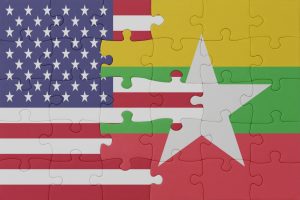Michael Martin is currently an adjunct fellow with the Center for Strategic and International Studies (CSIS) in Washington, where he has also spent the past two decades as a specialist policy advisor on Myanmar alongside China, Hong Kong, and Vietnam.
His work included a 15-year tenure with the Congressional Research Service of the Library of Congress, providing Congress with political and economic analysis, including the conflicts that have beset Myanmar.
It’s a subject that remains close to his heart and at CSIS he is free to speak about the civil war that erupted after the military ousted an elected government in early 2021, setting the country on a destructive course that has so far claimed about 50,000 lives.
Martin spoke with The Diplomat’s Luke Hunt about the realities confronting the military and the anti-regime forces, which include ethnic armed organizations (EAOs), the People’s Defense Force (PDF), and the political leadership within the National Unity Government.
It’s an issue that is gaining traction in diplomatic circles given the battlefield successes inflicted by EAOs and PDF over the past eight months, which many observers – including Martin – believe has marked a turning point in a war that the military is incapable of winning.
He also discusses a recent visit to Hanoi by Daniel Kritenbrink, the U.S. assistant secretary of state for East Asian and Pacific Affairs, who reportedly met there with Kyaw Lin Zaw, a commander in the Myanmar Navy.
On a final note, Martin also discusses the possible implications for Myanmar after the U.S. election in November, and how victory for sitting president Joe Biden or the re-election of Donald Trump will impact foreign policy.

































